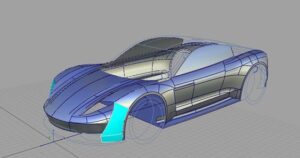
Hydrogen Fuel Cell Vehicles: An Awesome Alternative to Batteries

What is a Hydrogen Fuel Cell Vehicle?
First things first, let’s break down what a hydrogen fuel cell vehicle (or HFCV) actually is. Imagine a car that doesn’t need gasoline or even a huge battery to run. Instead, it uses hydrogen gas to create electricity right inside the car. This electricity then powers an electric motor, which makes the car go. Pretty neat, right?
How Do Hydrogen Fuel Cells Work?
Okay, so how does this whole hydrogen thing work? It’s kind of like magic, but with science. Here’s a simple way to understand it:
- Hydrogen Tank: The car has a tank where it stores hydrogen gas, kind of like how other cars store gasoline.
- Fuel Cell Stack: This is the heart of the car. It’s a special device that takes the hydrogen from the tank and mixes it with oxygen from the air.
- Electricity Production: When hydrogen and oxygen mix in the fuel cell, they create a chemical reaction. This reaction produces electricity.
- Powering the Car: The electricity from the fuel cell powers the electric motor, which makes the car move.
- Water Vapor: The only byproduct of this process is water vapor, which comes out of the car’s tailpipe. No pollution, just water!
Why Are Hydrogen Fuel Cell Vehicles Cool?
There are a bunch of reasons why hydrogen fuel cell vehicles are super cool and might be the next big thing in the world of cars.
- Eco-Friendly: Unlike regular cars that burn gasoline and release harmful gases, HFCVs only emit water vapor. This makes them really good for the environment.
- Quick Refueling: Filling up a hydrogen tank is almost as quick as filling up a gas tank – it only takes about 5 minutes! Compare that to the hours it can take to charge an electric car battery.
- Long Range: Hydrogen fuel cell cars can go a long way on a single tank of hydrogen. Some can travel over 300 miles before needing to refuel.
- Quiet and Smooth: Just like electric cars, hydrogen cars are super quiet and smooth to drive because they use an electric motor.
What Are the Challenges?
Of course, nothing’s perfect, and hydrogen fuel cell vehicles do have a few challenges to overcome.
- Hydrogen Stations: There aren’t that many hydrogen fueling stations yet. It’s kind of like when electric cars first came out and there weren’t many charging stations.
- Cost: Right now, hydrogen cars are pretty expensive. But as technology improves and more people start buying them, the prices should go down.
- Hydrogen Production: Making hydrogen gas can be tricky. It usually involves using natural gas or electricity, and both methods can have their own environmental impacts.
Hydrogen vs. Battery Electric Vehicles
So, you might be wondering how hydrogen fuel cell vehicles compare to battery electric vehicles (BEVs). Let’s look at a few key points.
- Refueling/Charging Time: Hydrogen cars win this one. They take just a few minutes to refuel, while electric cars can take anywhere from 30 minutes to several hours to charge.
- Range: Both types of cars can have a pretty long range, but hydrogen cars tend to have a slight edge here.
- Infrastructure: Electric cars have more charging stations available right now, but hydrogen stations are slowly popping up in more places.
- Environmental Impact: Both are much better for the environment than gasoline cars. BEVs can be very green if the electricity comes from renewable sources, and HFCVs are green if the hydrogen is made using renewable energy.
The Future of Hydrogen Fuel Cell Vehicles
The future looks bright for hydrogen fuel cell vehicles. As more people start to care about the environment and look for cleaner ways to get around, HFCVs could become a big part of our everyday lives. Here’s what might happen:
- More Hydrogen Stations: Companies and governments are working on building more hydrogen fueling stations. This means it’ll be easier to find a place to refuel your hydrogen car.
- Better Technology: Scientists and engineers are constantly working to improve fuel cell technology. This means hydrogen cars will get even better, cheaper, and more efficient.
- More Car Models: Right now, there are only a few hydrogen car models available, like the Toyota Mirai and the Hyundai Nexo. But in the future, more car manufacturers might start making their own hydrogen models.
Cool Facts About Hydrogen Fuel Cell Vehicles
Before we wrap up, here are some cool facts to impress your friends with:
- NASA’s Choice: Did you know that NASA has been using hydrogen fuel cells to power space shuttles for decades? If it’s good enough for space travel, it’s pretty awesome for cars too!
- Silent Rides: Hydrogen cars are super quiet because they use an electric motor. This makes for a peaceful driving experience.
- Quick Start: Hydrogen fuel cells can start producing electricity almost instantly, so there’s no waiting around.
Final Thoughts
Hydrogen fuel cell vehicles are an exciting alternative to both traditional gasoline cars and battery electric vehicles. They offer a clean, efficient, and futuristic way to travel. While there are still some hurdles to overcome, the potential for hydrogen cars is huge. As technology advances and more people get on board, we might see hydrogen cars become a common sight on our roads.
So, next time you think about the future of cars, don’t just think about electric batteries. Remember that hydrogen fuel cells are out there too, quietly and cleanly driving us into the future!




Average Rating